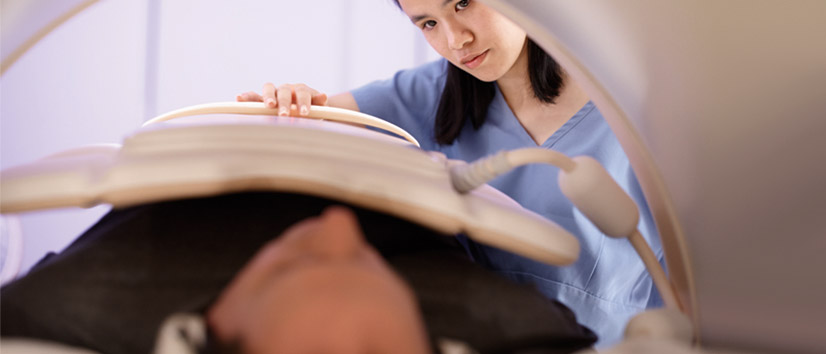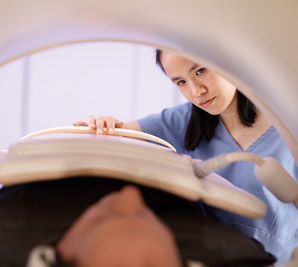
At 6-foot-4, 270 pounds, Tim Sullivan felt like a man in a test tube when he underwent an imaging exam in a traditional, closed bore MRI. “I had trouble breathing. It was just so small,” he says. “There is a button you can push to stop the procedure if you begin to feel claustrophobic, but I could hardly even move enough to get to it.”
While receiving treatment for cancer, Sullivan was subjected to numerous MRIs. Once he learned about the availability of the wide bore MRI scanner at Derry Imaging, he realized he found the answer to the claustrophobia.
“It is so much more comfortable,” he says. “I wasn’t touching any of the sides, except for maybe a little bit of my elbow. It felt twice as wide. I didn’t feel like I was in a closet.”
Patrick Cremman, an MRI technologist at Derry Imaging, has witnessed the difference in comfort level with patients since Derry Imaging installed a wide bore MRI scanner – named Hope – in their Bedford location in 2018. Another will be installed in Derry, replacing the mobile wide bore scanner they currently use.
Cremman says patients in a traditional MRI scanner, especially larger males, look like “a cork in a wine bottle. It’s a pretty snug fit for someone who is broad-shouldered or husky.” The wide bore scanner offers the ideal antidote to claustrophobic patients, with up to a 40 percent larger opening than closed scanners.
“There is plenty of room on each side for their arms, and even though they are supposed to remain still, just the knowledge that you’re capable of moving calms people down,” he says. “The feeling that their arms aren’t restrained tends to ease their anxiety.”
And it’s faster.
“I can do the same scan in 25 minutes as opposed to 35 with a traditional MRI,” Cremman says. “Ten minutes to someone who is claustrophobic is a lifetime. I’ve had many patients come here because they felt claustrophobic with a closed MRI, and almost all of them said the wide bore was ten times better than they’ve experienced in the past.”
An open MRI machine, which is open on three to four sides (depending on the manufacturer and model), also delivers greater comfort than a closed MRI and allows larger framed, obese or claustrophobic patients to be scanned. However, the overhead magnet is closer to the patient’s face so that the magnetic field remains strong. “The patient loses depth perception, so they feel more confined,” Cremman says.
Even patients who are slender and have no fear of confined spaces benefit from having an exam with wide bore MRI scanners because of image quality and time. They have a significantly stronger magnet than an open model, which results in a higher image quality. An open MRI takes roughly one and a half to two times longer to produce a comparable image. When it comes to diagnostic imaging, accuracy cannot be sacrificed.
“It boils down to being able to acquire the best images for the patient in the shortest time frame,” Cremman says. That’s how the wide bore offers hope.
Sullivan is convinced. “Now that I know about it, I would never go back to anything else,” he says.
Begin your own story of hope. Get a custom quote on an MRI at Derry Imaging and save 40-70% compared to hospital imaging centers.
Request a Quote

